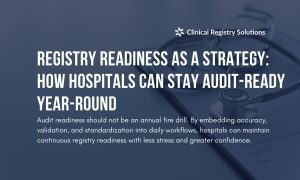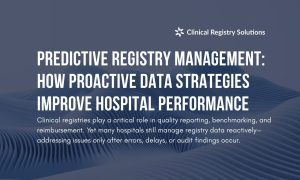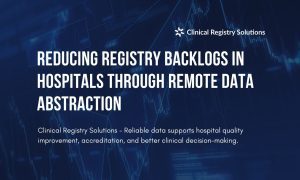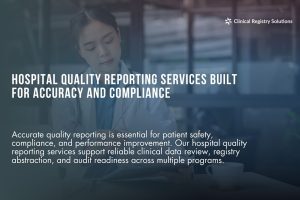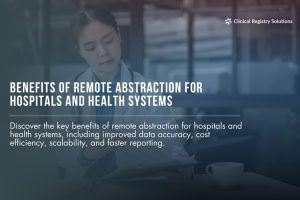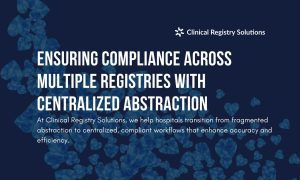Preparing accurate medical records is essential for delivering high-quality patient care. Errors in medical data can lead to misdiagnosis, incorrect treatments, and unnecessary hospitalizations, all of which jeopardize patient safety and healthcare outcomes.
Remote registry services offer an efficient, agile, and precise way to manage medical data—resulting in flawless patient records and better clinical decision-making.
In this blog, we’ll explore how medical record abstraction combined with remote registry services improves data accuracy, enhances healthcare outcomes, and reduces administrative burdens on medical staff.
What Are Remote Registry Services?
Remote Registry Services involve outsourcing medical data management tasks to specialized professionals who collect, analyze, and verify patient data from a remote location. These experts ease the documentation workload for hospitals and healthcare providers, ensuring accurate and timely data handling without the need for on-site personnel.
How Remote Registry Services Work
- Specialists securely access the hospital’s Electronic Health Record (EHR) system remotely.
- They extract and abstract relevant medical data following established protocols.
- The data is cleaned, validated, and submitted to appropriate registries.
- Healthcare providers receive comprehensive reports to enhance patient care quality.
The Importance of Medical Record Accuracy
Accurate medical records are critical for delivering safe and effective treatment. Incomplete or incorrect documentation can lead to diagnostic errors, delayed care, and patient harm.
Why Accuracy Matters
- Reduces medical errors and misdiagnosis: Precise documentation prevents life-threatening mistakes in patient care.
- Ensures correct treatments and medications: Reliable records help avoid harmful drug interactions and unnecessary procedures.
- Improves hospital efficiency and resource management: Streamlined workflows reduce redundancies and optimize resource allocation.
- Helps meet regulatory requirements: Compliance with healthcare laws protects facilities from penalties and maintains data integrity.
- Supports clinical research: Accurate data fuels advances in medical treatments and public health strategies.
How Remote Registry Services Improve Medical Record Accuracy
Minimizing Human Errors in Data Entry
Remote registry specialists are trained to identify discrepancies, validate data, and reduce common mistakes that occur during manual entry—especially in busy hospital settings.
Ensuring Compliance with Healthcare Standards
These professionals stay current with evolving regulations and ensure records meet national and international guidelines, helping facilities avoid costly compliance issues.
Increasing Efficiency for Healthcare Staff
By outsourcing data management, doctors and nurses can focus more on patient care, reducing burnout and improving overall productivity.
Providing Expertise in Medical Record Abstraction
Remote abstractors have deep knowledge of clinical terminology and documentation standards, enabling them to extract complex data accurately and meaningfully.
Enhancing Data Security and Confidentiality
Remote services employ encrypted connections and adhere to HIPAA standards, ensuring patient information remains secure throughout the process.
Key Benefits of Remote Registry Services
- Higher accuracy through meticulous data verification
- Cost savings by eliminating the need for full-time in-house data teams
- Faster data processing and timely submissions to registries
- Regulatory compliance that withstands audits and inspections
- Improved decision-making with reliable data for treatment plans
- Scalability to serve clinics of all sizes
- Reduced physician burnout by offloading administrative tasks
Addressing Challenges in Medical Record Management
| Challenge | Solution |
| Missing or incomplete data | Remote professionals verify and fill gaps by cross-checking registry requirements |
| Staffing shortages | Outsourcing ensures accurate data entry without adding to hospital workload |
| Regulatory changes | Remote specialists stay updated with laws to keep records compliant |
| Data security concerns | Encryption and strict privacy protocols safeguard patient information |
How to Integrate Remote Registry Services in Your Facility
- Assess your data management needs: Identify areas requiring improved accuracy or additional support.
- Choose qualified providers: Ensure they have credentials in medical record abstraction and comply with HIPAA and other regulations.
- Establish secure data sharing protocols: Use encrypted connections and limit access to authorized personnel only.
- Regularly evaluate performance: Monitor accuracy reports and collaborate with remote teams to refine workflows.
FAQs
How do Remote Registry Services improve medical record accuracy?
They employ trained specialists who meticulously verify, correct, and manage patient data to minimize errors.
Are Remote Registry Services confidential?
Yes, they use encrypted systems and comply with HIPAA to protect patient privacy.
Can smaller clinics use Remote Registry Services?
Absolutely. These services scale to fit the needs of both small clinics and large hospitals.
What is Medical Record Abstraction?
It is the process of extracting relevant information from various medical documents to facilitate analysis and reporting.
How much do Remote Registry Services cost?
Costs vary depending on facility size and scope, but they are generally more affordable than maintaining in-house teams.
Conclusion
Remote Registry Services are a vital solution for ensuring accurate medical record abstraction and efficient data management. By outsourcing these functions, healthcare facilities reduce errors, improve compliance, and free up valuable clinical staff to focus on patient care.
Whether you operate a large hospital or a small clinic, remote services offer a flexible, cost-effective way to maintain precise, secure medical records and enhance patient outcomes.
